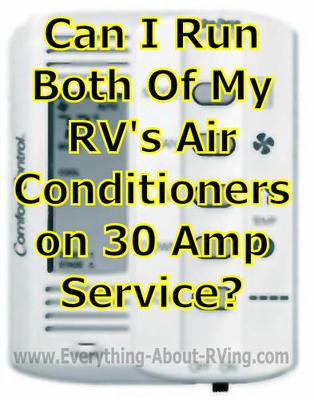- Home Page
- Ask RV Questions
- Can I Run Both Of My RV's Air Conditioners on 30 Amp Service?
Can I Run Both Of My RV's Air Conditioners on 30 Amp Service?
by Mark
(Louisinia)
I have 30 amp service only one AC will work at a time. How do I make both work at the same time.
ANSWER: Hi Mark thanks for submitting your question on our Ask An RV Question Page
I am afraid I am not going to be the bearer of good news. I am going to assume that your RV can also be plugged into 50 amp service and that you have no problems running both ACs when plugged into the 50 amp service.
I am also going to assume that your RV is not equipped with an Energy Management System (EMS) and that you have attempted to run both ACs on the 30 amp service and that you have tripped the circuit breaker on the electrical hookup at the RV park.
In most cases it is not possible to run both ACs on an RV that is connected to a 30 amp circuit. A great rule of thumb here is the older the RV and the larger the AC units are the lesser chance you have of successfully running both ACs on 30 Amps.
On some newer model RVs that have more energy efficient AC units you can run two units on 30 Amps as long as you do not attempt to run other electrically demanding appliances such as a microwave, hair dryer, electric heating element for a water heater, etc. Even some newer RVs equipped with Energy Management Systems (EMS) are not able to run both ACs on 30 Amps.
An Energy Management System or EMS is a system that automatically controls the appliances in your RV to stay within the power that is available to your RV. If you are using your AC on a 15 or 30 amp circuit it will turn off (shed) other appliances so that you do not trip the circuit breaker on the power source.
Some RVers have modified their RVs electrical systems so that one of the AC units can be plugged into a separate 15 amp receptacle (if available). But, this is not something I am going to go into details on here as it is modifying the factory installed electrical system on the RV and if done incorrectly can create safety concerns for fire, shock, personal injury or death.
I know that this is not what you wanted to hear, but at least you now know that this is normal and not a problem with your RV.
Do you have any suggestions or comments on this topic? You can add them to this page by clicking on the "Click Here To Post Comments" link located near the bottom of this page.
Happy RVing
RVing Al
Comments for Can I Run Both Of My RV's Air Conditioners on 30 Amp Service?
|
||
|
||
|
||
|
||
|
||
|
||
|
||
|
||
|
||
|
||
|
||
|
||

